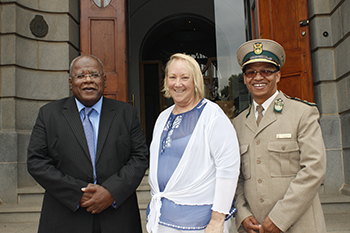Latest News Archive
Please select Category, Year, and then Month to display items
12 October 2020
|
Story Dr Cindé Greyling
|
Photo Supplied
 Exercise and nutrition can work wonders for your mental health – you don’t even have to ‘feel like’ or ‘enjoy’ moving around and eating well for it to work – it does its thing anyway.
Exercise and nutrition can work wonders for your mental health – you don’t even have to ‘feel like’ or ‘enjoy’ moving around and eating well for it to work – it does its thing anyway.
Nowadays, people talk about mental health like it is the common cold – which is good! But do you know what it really means? Being mentally healthy does not only refer to the absence of a mental illness but includes your emotional and social well-being. One would almost want to add physical well-being too, since a healthy body does indeed support a healthy mind. However, since so many people consider themselves ‘mental health experts’, some myths have been sold as truths.
Myth #1 – You are doomed.
Nope. Never. You are never doomed. There is always help. Mental-health therapies range from self-help, talk therapy, medication, to hospitalisation in some cases. Somewhere on this spectrum of treatments, there will be something that works for you. But you must be willing to get the help and do the work. For starters, exercise and nutrition can work wonders – you do not even have to ‘feel like’ or ‘enjoy’ moving around and eating well for it to work – it does its thing anyway.
Myth #2 – It won’t affect you.
It may. Research suggests that one in five people may suffer from a mental illness at some point in their lives. Being well now does not mean that it will stay that way. Biological and environmental factors both impact your mental health. Hopefully not, but at some point, you may experience an event that affects your mental health.
To remain integrated in a community is always beneficial
for anyone suffering from a mental or physical condition.
Myth #3 – Someone struggling with mental health must be left alone.
Hardly! To remain integrated in a community is always beneficial for anyone suffering from a mental or physical condition. You do not need to fix them, but to remain a friend. Continue to invite them, even if they decline. Do not judge, and do not try to understand. Just stay around.
Go and be kind to yourself, and to those around you.
UFS Postgraduate student council’s community project a success
2016-03-03

Prof Jansen Vice-Chancellor and Rector, Dr Henriette van den Berg, Director of Postgraduate School, and Mr Gustav Wilson, Regional Head: Development and Care, Free State and Northern Cape Region. |
The University of the Free State’s Postgraduate Student Council embarked on a courageous community engagement project for Mandela Day in 2015. The programme was aimed at assisting offenders at Tswelopele Correctional Centre pass their matric exams, thus granting them access to tertiary education.
The Postgraduate Student Council assisted the 2015 matriculants with study support, and motivated them during their final examinations in 2015. The council will play a bigger role this year by offering offenders at Tswelopele career advice and career guidance for when they leave the correctional facility, as well as study techniques to assist them throughout the year, to ensure a 100% pass mark in 2016.
Offenders who had participated in the Postgraduate Student Council project attended the Postgraduate School’s Open Day on 19 February. Of the 12 offenders, 11 passed their matric exams, while one is currently busy with his supplementary exams. Tswelopele has a 92% pass rate; it is the best performing correctional centre in South Africa.
The Tswelopele Correctional Centre also serves as a full-time high school (Grade 10-12), and TVET College, assisting offenders to register for tertiary education through various universities.
Prof Jonathan Jansen, Vice-Chancellor and Rector of the University of the Free State, said that he was immensely proud of the matriculants from Tswelopele Correctional Centre. He added that it is vital for every human being to receive a second chance. “Rehabilitation programmes are meant to give offenders a second chance at life, because we cannot give up on humanity. Correctional centres and rehabilitation centres are a societal responsibility. Society must not give up on offenders, everyone deserves a second chance, and we cannot give up on humanity.”
“To our offenders going through rehabilitation and all our young people who are our hope for the future of our beloved country, be encouraged. Dream again. Discover the wonder in your lives,” said Mr Gustav Wilson, Regional Head: Development and Care, Free State and Northern Cape Region.